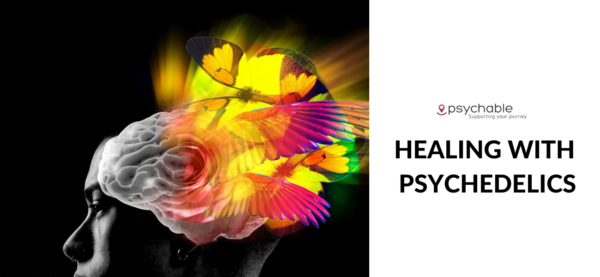While the medical world is in the midst of a psychedelic renaissance, it’s more important than ever to expand education around the healing potential of these substances and erase “hippie era” stigmas. Online community Psychable is advancing the dialogue in both the medical and patient communities, through its platform that connects those interested in exploring or providing legal psychedelic-assisted therapy services.
Chris Becker, a former postdoctoral associate at MIT in chemistry and physics, recently released a book called Healing with Psychedelics. In a series of essays and poems, Becker explores how psychological injuries and trauma suffered during childhood often lead people to create false selves in order to survive. This contributes to all sorts of physical and emotional suffering, disconnection, addictive behaviors, depression, anxiety, and alienation.
In Healing with Psychedelics, Becker shares his personal healing journey with psychedelic-assisted psychotherapy and spirituality, and how it led him to transformation. He hopes that he can inspire others to seek and actualize profound transformation for themselves.
Recently, psychedelic-assisted psychotherapy is gaining a lot more attention in mainstream media. Clinical trials of MDMA-assisted psychotherapy for the treatment of PTSD moved into Phase III trials with Breakthrough Therapy status – a designation meant to expedite the FDA approval process of novel treatments for conditions that conventional means are failing to address. Psilocybin-assisted psychotherapy for major depressive disorder also received breakthrough therapy designation and may be available to people with depression in the next few years.
Clinical trials are not the only way that people experience psychedelic healing. After psychedelics were made illegal in 1971 through the controlled substances act, many psychedelic practitioners and users went underground or moved to countries with less restrictions in order to continue their work with altered states of consciousness. Underground use is prevalent, and rising: in 2018, over 1.1 million Americans tried hallucinogens for the first time. Interestingly, new users of psychedelics were more likely to be over the age of 25, not teenagers as one might expect.
Meanwhile, more cities are decriminalizing naturally-occurring psychedelics, starting with Oakland, CA, and now including our very own Cambridge, Somerville, and Northampton, MA.
Decriminalization can be a confusing term; since most psychedelics remain federally illegal as Schedule I controlled substances, local jurisdictions don’t have the power to fully decriminalize something, but they can make it the lowest priority of law enforcement to police. Still, the sale of Schedule I controlled substances, even in a city with decriminalization, can result in drug-trafficking charges.
Decriminalization offers a chance for the country to begin to exit the War on Drugs, a several decades-long initiative that only increased racial inequities and disparities by disproportionately locking up people of color for drug possession. The War on Drugs failed to keep drugs out of the hands of the general public and led to more risk for people who use drugs, as there is no regulation of the substances or harm reduction support available.
Oregon made a bold step when the voters approved Measure 110, the Drug Addiction Treatment and Recovery Act, in 2020. This measure regards drug use as a medical rather than a criminal issue, and as of February 2021, all drugs are decriminalized in the state of Oregon. Portugal decriminalized all drugs in 2001 and has seen improvements in public health related to drug use ever since. Will Massachusetts be the next state to do the same?
Psychedelics are best understood as tools. It’s not useful to paint them as inherently good or bad, similarly to how a knife can be used in the service of healing or harm. In general, survey research finds that psychedelics are not independent risk factors for mental health. In fact, psychedelic use is associated with a lower rate of mental health problems. However, tripping is not for everyone.
People with a family history of bipolar illness or psychosis should exercise extreme caution around psychedelic use and consult with an informed professional before trying anything. Psychedelics can bring up past trauma. It’s important to be mindful of set (a person’s mindset, emotional and physical state) and setting (the environment, as well as cultural contexts) when diving into the psychedelic realms.
As the legal landscape continues to shift, Psychable aims to simplify the process of finding experienced professionals offering legal healing modalities (such as ketamine-assisted therapy, somatic healing, and breathwork), along with integration specialists that can help people with before and after their psychedelic experience.
Psychable supports service-seekers and practitioners, as well as those who are just learning about psychedelic-assisted therapy, through evidence-based research, an engaged and passionate online forum, and a professional directory powered by ratings and reviews.
If you are interested in exploring psychedelics, you can dive deeper into these topics through Psychable’s wealth of educational content and articles. You can learn more about the history of psychedelics, the different substances, how they are being used in research and therapy, and how these fascinating tools might help you reach your goals and improve your life.
Consider signing up for a profile on Psychable to become part of the conversation! With an account, you can post in the community forum and search through the directory of psychedelic therapists and psychedelic integration practitioners, learn about their background, ask questions and read reviews of other seekers who have worked with that practitioner.
With appropriate use, psychedelics may be safely and beneficially integrated into modern society. Come be part of the evolution!

